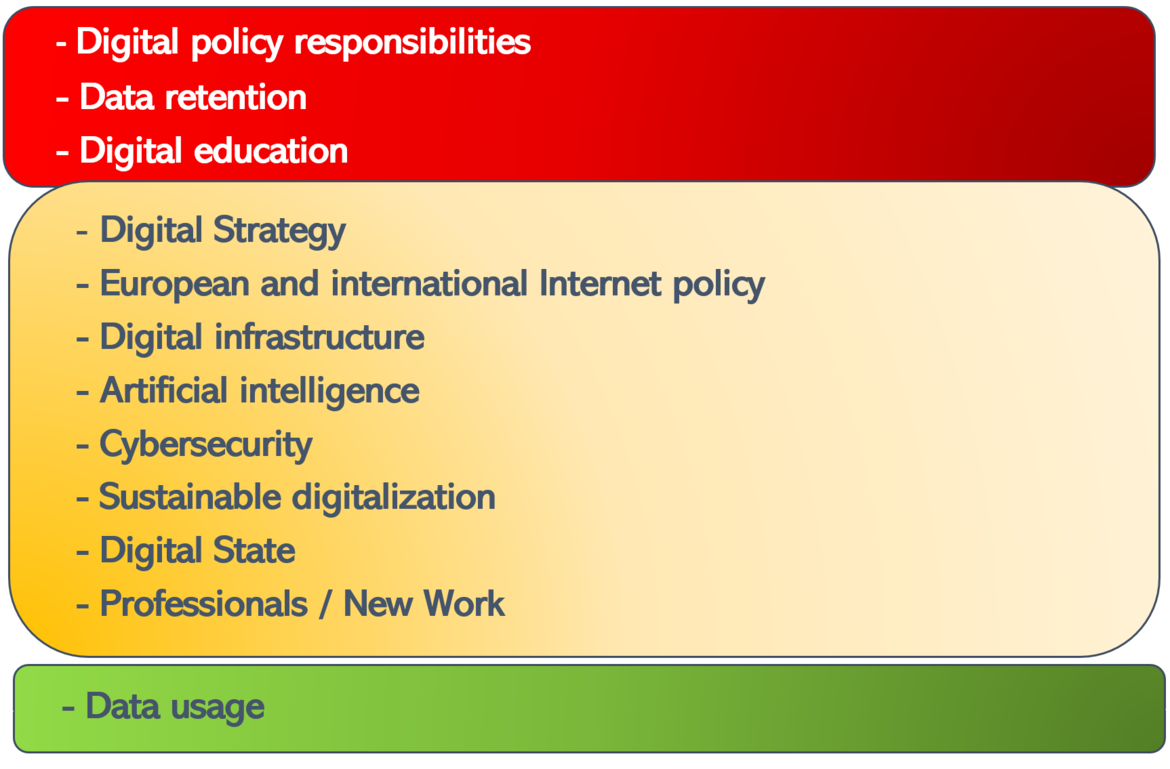How to Boost Digital Responsibilities in Germany: A Call for Stronger Coordination
Germany’s digital ministry and strategy provide good prospects for upgraded digital responsibilities– but only if strong coordination occurs across departments, as spelt out by eco’s Managing Director Alexander Rabe.

©wildpixel | istockphoto.com
After coming into being on 8 December 2021, the German “traffic light” coalition – comprising of SPD, Bündnis 90/The Greens, and FDP – immediately put forward strong digital responsibility commitments, pledging a new impetus to Germany as a digital location. Half-way through its four-year legislative term, it is however evident that the coalition still has a long way to go in achieving all of its commitments. But luckily, based on the government’s new digital ministry and Digital Strategy, there is a reasonable prospect for moving forward with Germany’s digital responsibilities. However, to bring this into fruition, we at eco – the leading association of the Internet industry in Europe – call for much stronger coordination to take place at the senior government level.
In November 2023, eco Association conducted a “Traffic Light Coalition Check,” evaluating twelve topics from the coalition’s initial agreement via their current status. In reviewing these digital policy areas, just one factor – data usage – received a “green light.”
On the flip side, three fields were unfortunately identified as being in the “red light” zone: these entailed not only data retention and digital education, but also digital policy responsibilities. However, from a mid-level perspective, there was also a more positive “amber light” for eight factors, including, for example, cybersecurity, the Digital Strategy, and sustainable digitalization.

Upon reviewing all of these twelve factors, what is clear is that many of these have been constructively taken on board, but full realization is still pending. In this context, we at eco are of the strong opinion that “digital policy responsibilities” should be Priority Number One, as the success of the other eleven factors are heavily reliant on such responsibilities.
Upgrading digital policy responsibilities via coordination
From the outset, we at eco have strongly advocated to have a leading digital ministry which coordinates all departments and takes on board the responsibility for all digital aspects. On the one hand, it is good to know that there is now a German digital ministry, known as the Federal Ministry for Digital and Transport (BMDV). On the other hand, as our Chair of the eco Board Oliver Süme states, it is imperative that such a digital ministry should be empowered to coordinate digitalization across all other ministries, thereby “taking the lead, setting goals, establishing priorities, and monitoring the implementation of sub-projects.”
As Managing Director at eco Association, this also rings a very loud bell for me. Over the past year, I have been heavily involved in collaborative work with the German coalition government, with this showcasing just how important it is to bring strong coordination to realization. In having been appointed to join the “Digital Strategy” Advisory Board of the Federal Ministry for Digital and Transport – with this including 19 disciplinary experts from science, industry, and the civil society – I am happy to have been involved in three important projects in the spheres of founding a data institute, the development of digital identities, and digital family assistants. In working in these projects, I gained strong insights into the major potential (but also the challenges) of such coordination. Overall, in bringing experts from different sections together, things can really be accelerated – but this means that the responsible departments need to develop a unified approach, share much more content, do so in a timely manner, and collectively devise solution scenarios.
Samples portraying the essential role of upgraded cooperation
As a member of this Advisory Board, I have noted how far more coordination is required for all of the 19 projects outlined in the Digital Strategy. Despite these projects often sharing core challenges, they are approached differently in various departments. It is therefore crystal clear that all of the current and forthcoming digital responsibilities require collaboration at multiple levels.
To cite a particular example: When it comes to dealing with threat situations via cybersecurity, it is naturally good to know that the German KRITIS Umbrella Act provides a comprehensible framework for the protection of critical systems and aims to strengthen the resilience of critical infrastructures. Nonetheless, while we at eco welcome this goal, uncertainties persist regarding the actual impact of the KRITIS Umbrella Act, particularly in coordination with the draft law in the transposition of the NIS2 (the European Network and Information Security Directive). At present, the relationship with the NIS2 is still unclear, and the extent to which security vulnerabilities will be shared with companies and infrastructure operators in the future remains ambiguous. In particular, the distribution of roles between the existing supervisory authorities – primarily the BSI (Federal Office for Information Security) and BNetzA (Federal Network Agency) – and the future-responsible BBK (Federal Office for Civil Protection) must be clarified so that no double or triple regulation is established. Overall, what such an analysis explicitly shows is that decision-making requires an overarching set of collaborative responsibilities within the coalition.
Such decision-making clearly not only applies to cybersecurity, but to each and every one of the digital policy areas. When it comes to sustainable digitalization, for example, the positive aspects of the German Energy Efficiency Act are still hindered by a range of regulations that would be difficult to achieve without a cross-agency digital responsibility approach.
Robust collaboration is needed to support future technologies and fields generating added value for the future. What’s more, despite Germany’s recent “debt brake,” projects essential for climate protection should not face budget cuts. In this regard, as part of the boosted coordination, the digital ministry should have an independent digital budget with corresponding control functions and should thus be fortified to manage interdepartmental synchronization.
Reorientation of digital coordination
Overall, in dealing with such digital location challenges, it is clear that a reorientation of digital coordination is required. On the plus side, the majority of the projects included in the Digital Strategy – such as network expansion, introduction of uniform technical norms and standards, and the establishment of secure digital identities – have begun to help things look more positive. However, the traffic light coalition must now urgently accelerate initiatives in the areas of sustainability, administrative digitalization, digital education, the expansion of digital infrastructures, and – in particular – cybersecurity.
Ultimately, a leading digital ministry must ensure synergy on digitalization between departments; otherwise we will continue to see the diffusion of responsibility in digital matters and the lack of access or overview of other areas. From this perspective, we at eco urge the German digital ministry for strong coordination across departments in addressing digitalization – involving shared commitment, passion, courage, and expertise.
Since January 2018, Alexander Rabe has been the Managing Director of eco – Association of the Internet Industry, the largest Internet industry association in Europe. He took over the management of eco’s Capital Office, including the division of Policy, Law and Regulations, in 2016. Prior to that, Rabe was CEO of the Gesellschaft für Informatik (GI) and CEO of German Informatik Akademie GmbH in Bonn.




